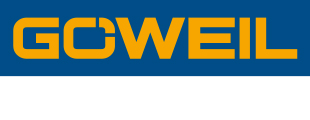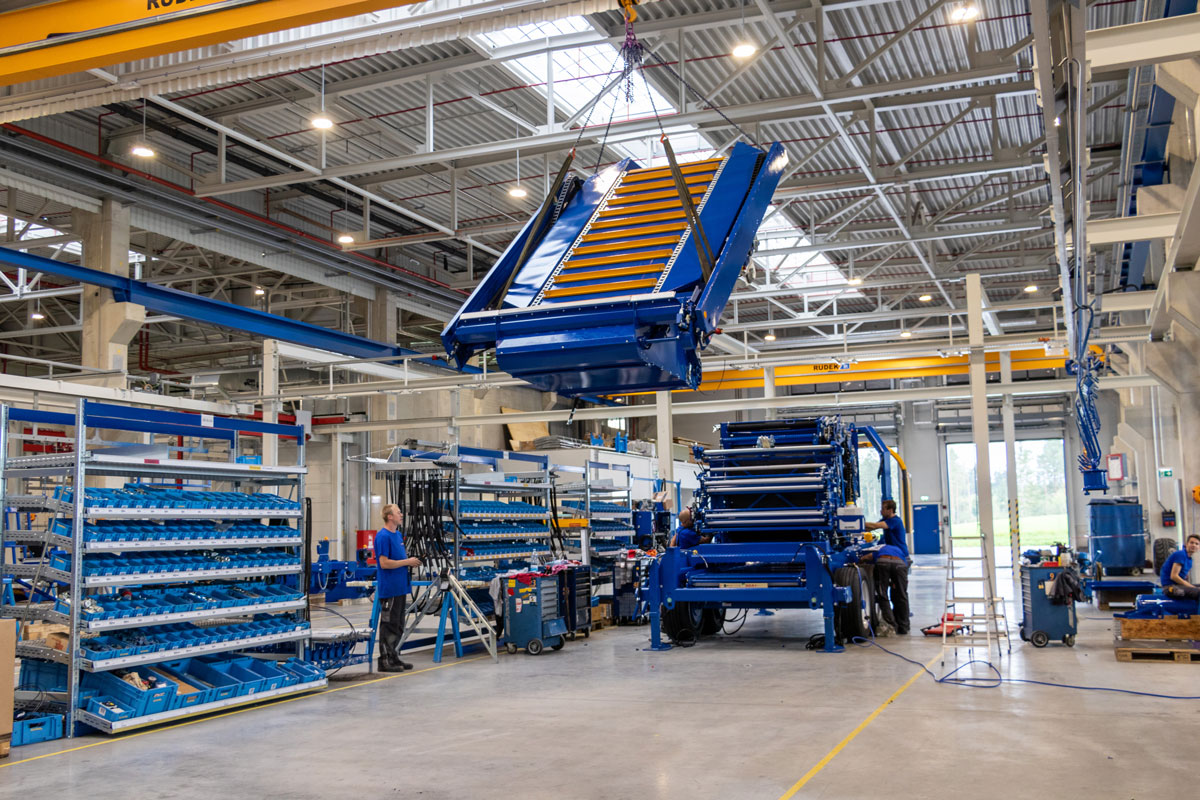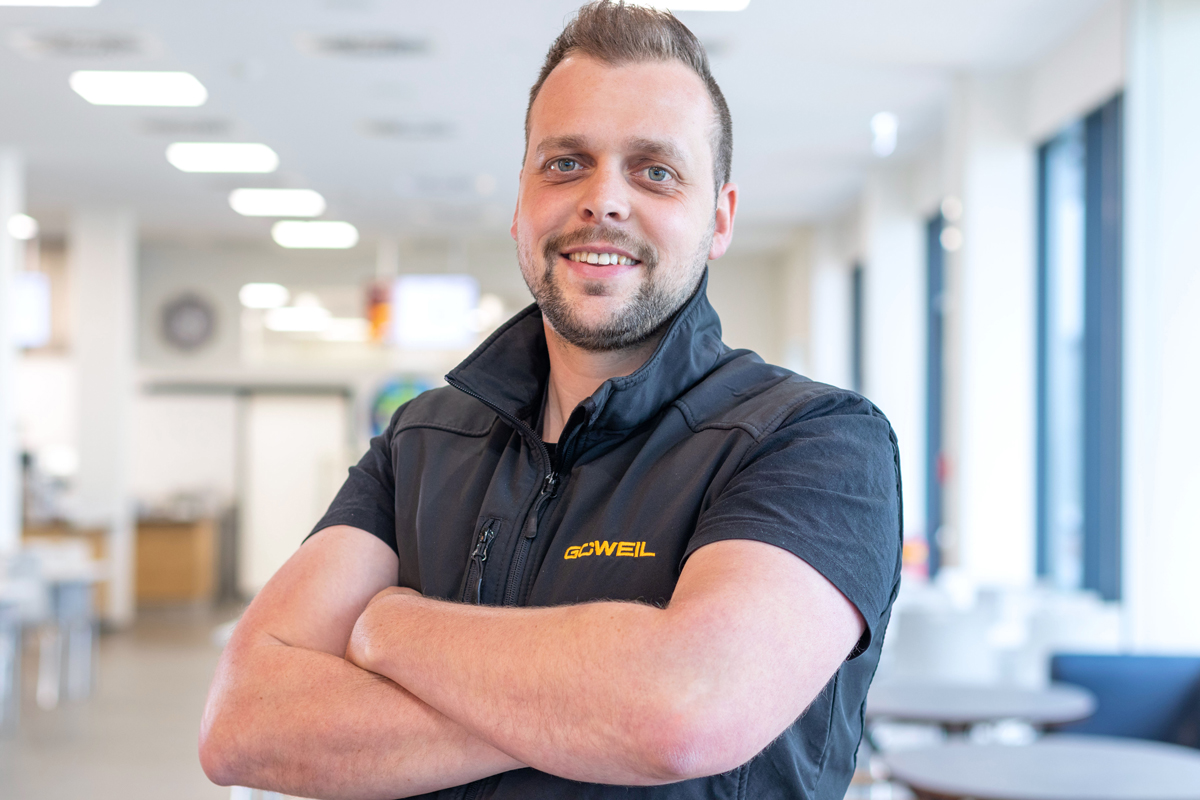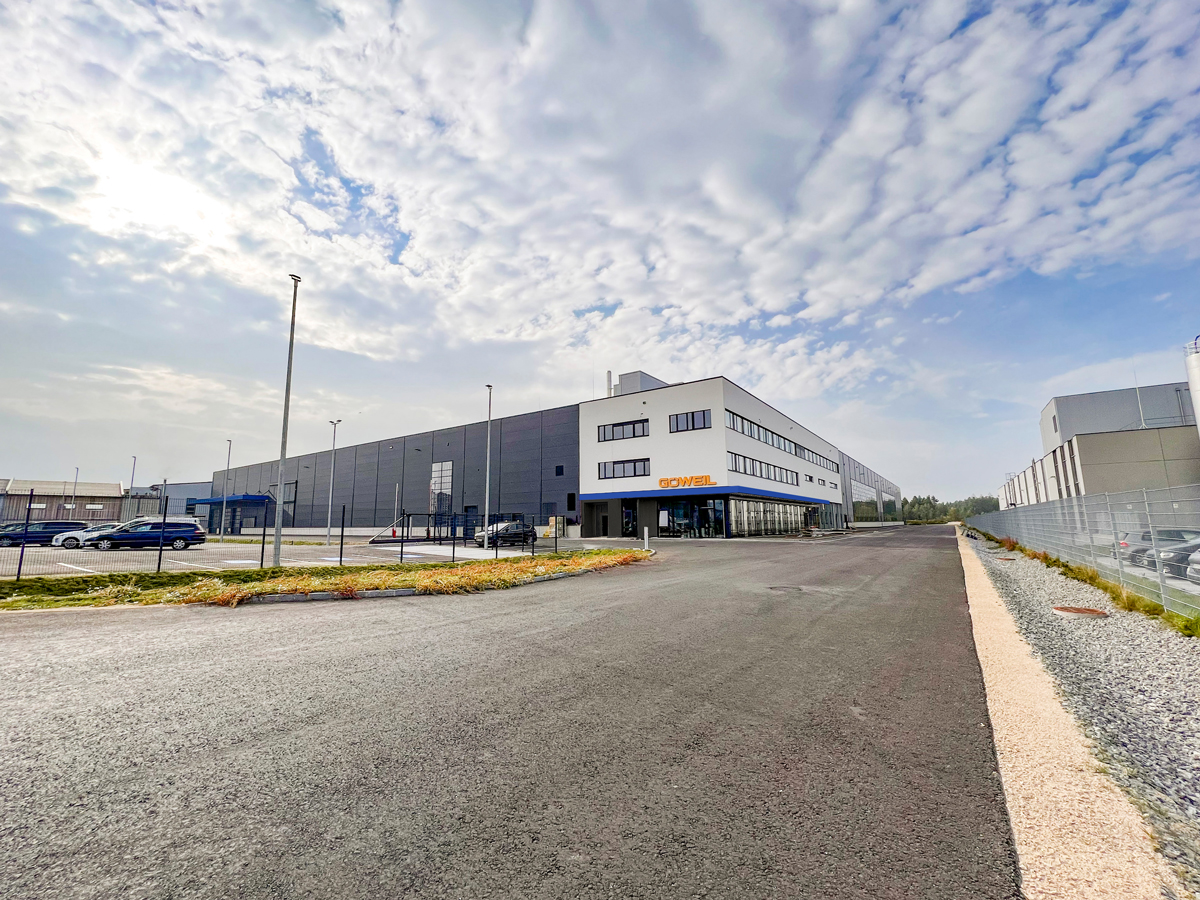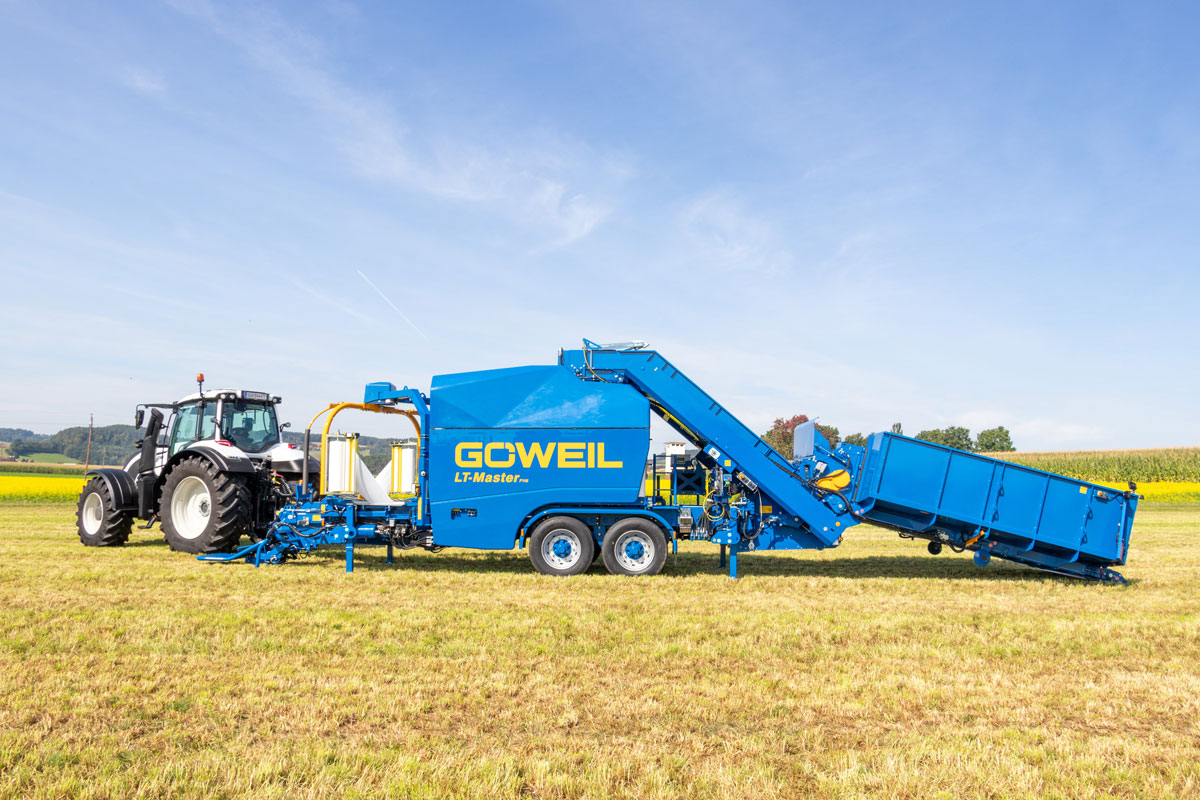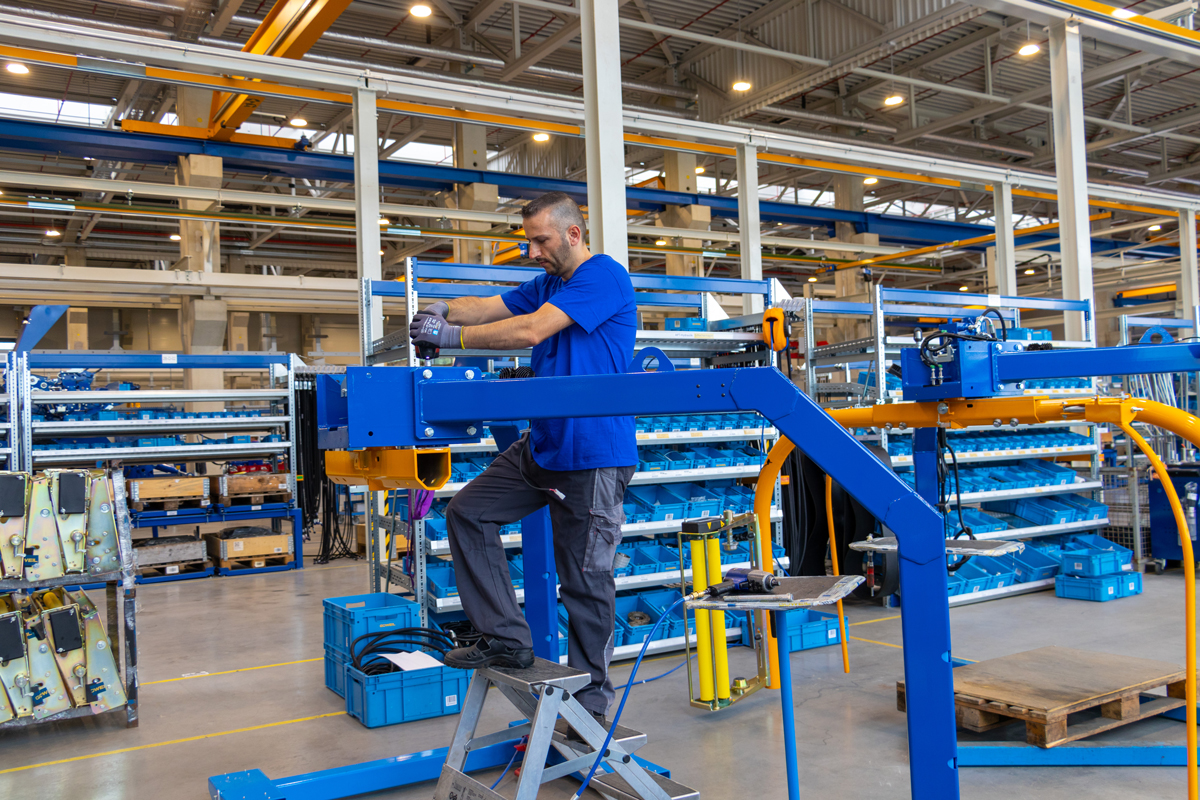Case Study GOEWEIL
The agricultural machinery manufacturer and machine builder GOEWEIL has set up a “smart factory” at its latest site, which is paving the way for the company’s future thanks to state-of-the-art technologies and systems. cronetwork MES plays a central role here as the leading system on the shop floor!
Best optimization results thanks to cronetwork
efficient planning of
beat chain system
transparent
processes
automated,
paperless workflows
high user
acceptance
optimised resource
efficiency
close integration
with ERP & WMS
Ready for the future: Agricultural machinery manufacturer digitalises production
When we think of the production of agricultural machinery, very few of us have images of an ultra-modern, tidy and, above all, digitalised production environment in our mind‘s eye. But this is exactly what you will find in Rainbach in Upper Austria – the successful agricultural machinery manufacturer and machine builder GOEWEIL has set up a “smart factory“ at its latest site, which is paving the way for the company‘s future thanks to state-of-the-art technologies and systems. cronetwork MES plays a central role here as the leading system on the shop floor!
For more than 35 years, the name GOEWEIL has stood for the highest quality product programme in the field of bale wrapping and baling technology on the agricultural machinery market. Thanks to a very high export share, the Austrian machines are not only known and successfully used in Europe, but also worldwide. In addition, the extremely robust and powerful machines are now also used in industrial environments. In other words, the family-run company has grown rapidly, but is also facing new challenges.
New location, new challenges
GOEWEIL products have always been produced at the main site in Kirchschlag in Upper Austria. In order to be able to meet the new market requirements and high demand in the future, investments were made in the construction of a completely new production site. Agricultural products are now also painted, assembled and dispatched in Rainbach on an area of more than 15,000 m².
Closely linked to the ambitious project was the desire for comprehensive digitalisation at the site. Mathias Kapfer, Operations Manager at the Rainbach site, recalls the challenges at the start of the project: “We rely on a bead chain system in the paint shop and assembly. This means that the planned processes take place in a fixed order sequence that is difficult or impossible to intervene in. The challenge lies in equipping the transport elements for the parts to be painted (the so-called carriers) with components in such a way that the formulas and painting processes defined for them fit together and can subsequently be supplied to the correct assembly stations. This basic setting alone eliminated several suppliers in the MES pre-selection process!” The aim was to “attack” the painted parts as little as possible and to always have them at the right places and workstations without any major detours.
Integrative systems are the key
An ERP and warehouse management system (WMS) were already in use at GOEWEIL before construction of the new site began. The MES planned for production was to be seamlessly linked to the existing structures and form a unit with them. With cronetwork MES, a system was ultimately found that ideally maps and supports the existing and future processes.
Today, the WMS is triggered by the detailed production planning and thus the necessary picking steps are initiated. The parts to be painted set off, are planned on carriers and finally pass through the paint shop. In detail, this means that based on the planning data in detailed scheduling, the WMS is informed where and at what time the required components need to be provided in production. An availability check is carried out via the WMS, which returns the updated data to cronetwork MES. If all components are available, the order is released by the planner. This is followed by the scheduling and commissioning of the transports by the WMS, the start of the painting process and finally the delivery to the assembly workstations. cronetwork is always informed about order statuses, storage locations, etc. through continuous, automatic synchronisation and thus assumes the leading role in the digital shop floor process.
Optimisation potential thanks to intensive use
In addition to the paint shop, assembly is also planned using cronetwork detailed scheduling. Most GOEWEIL products consist of a large number of assemblies. These are fed to the final assembly line “just-in-time“ from several workstations via cronetwork MES. This means that these neighbouring workstations must be planned in such a way that the final assembly line is optimally supplied with the necessary assemblies. This complex task can be mastered very efficiently with cronetwork MES.
The data collected (quantities, times, etc.) is recorded using cronetwork plant data collection (PDC). The focus here is on the employees on the shop floor. Employees are informed via the terminals at the workstation when which assembly sections need to be started or completed and when the required parts are available. They can also call up other product-relevant information such as drawings. “Our colleagues also like to use the cronetwork terminals to look into the near future. This means they are better prepared for upcoming orders. One effect that we underestimate is the many ideas for optimisation that come from our employees based on this new information and constantly improve our processes,” says Kapfer. An important factor is the close cooperation and the right of colleagues to have a say in the design of the terminals.
MES is now the central system in production
Mathias Kapfer sums up the current status of the digitalisation measures on the shop floor: “cronetwork MES is the central system in our production. All orders from our ERP are automatically transferred to the MES, moulded into a timeline with the help of detailed scheduling and automatically sent to the linked systems such as the WMS, the paint shop and the assembly workstations after final approval. You could say that cronetwork detailed scheduling is THE tool for our AV to be able to mirror production as a digital timeline. As a result, we now work in a more structured, well-planned way and have been able to free up resources.“ Kapfer also praises the professional cooperation with Industrie Informatik: “To put it simply, cronetwork MES has covered our requirements best of all the providers. We have also been in close contact with the staff at Industrie Informatik since the start of the project. They always endeavour to implement our additional requirements in the standard, which is possible to a very high percentage. However, customised adaptations are also no problem and can be implemented quickly.“
Conclusion
The digital shop floor has become a reality at the new GOEWEIL site. The MES as the central hub for this delivers what was expected of it – and even more. Above all, the digital mapping of the bead chain system in cronetwork is an important step towards resource efficiency. A large proportion of warehouse and logistics activities are no longer necessary and chaotic warehouses are a thing of the past. The close connection and high level of integration with neighbouring systems such as ERP and WMS enable paperless, automated, structured and documented workflows. In addition, the high-performance detailed production planning system takes care of scheduling coordination on the shop floor, which takes a lot of work off the shoulders of the foreman and frees up capacity and concentration for other important tasks in the plant. Last but not least, the transparent processes (keyword terminals) have uncovered a great deal of further optimisation potential on the production line.
Mathias Kapfer concludes: “We are currently still working on further optimising the use of cronetwork MES in our plant. The possibilities in the combination of MDC, PDC and detailed scheduling are huge and we are only at the beginning of our journey!“
Photos: © GOEWEIL Maschinenbau GmbH
Products:
Agricultural machinery in the field of bale wrapping and balingtechnology, bale loosening and transport equipment, high-tip buckets and knife grinders
Employees:
approx. 270
cronetwork modules:
plant data collection, machine data collection, detailed scheduling (APS)
“We rely on a bead chain system in the paint shop and assembly. This means that the planned processes take place in a fixed order sequence that is difficult or impossible to intervene in. The challenge lies in equipping the transport elements for the parts to be painted (the so-called carriers) with components in such a way that the formulas and painting processes defined for them fit together and can subsequently be supplied to the correct assembly stations.”
